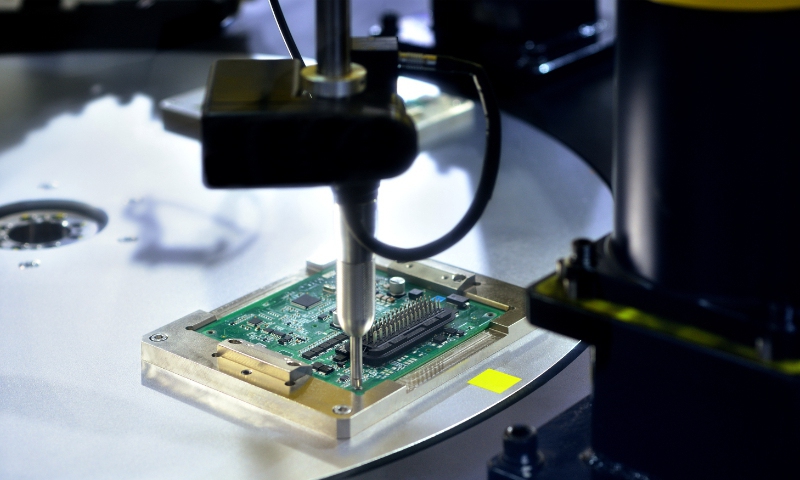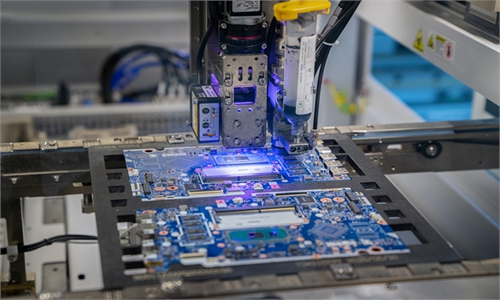
Production of semiconductor chip File photo: VCG
The US government's reported plan to award $1.5 billion in subsidies to another US chipmaker showed Washington's intensified efforts to lure more chipmakers to expand production within its borders, but such protectionist, anti-market moves are unlikely to reshape the global chip supply chain to reassert its dominance, Chinese experts said on Wednesday.
With subsidies under its so-called Chips and Science Act and export restrictions, the US is trying to crack down on China's semiconductor industry. But it has so far failed to curb the rise of Chinese chip capabilities, as China's self-reliance and global market share are both on a steady rise, experts noted.
The US Department of Commerce reached a preliminary agreement with US chipmaker GlobalFoundries to build a new semiconductor production facility in Malta, New York, and expand existing operations there and in Burlington, Vermont, Reuters reported on Tuesday.
Under the plan, the US government would provide $1.5 billion in subsidies, which would be accompanied by $1.6 billion in loans, and the funding is expected to generate $12.5 billion in overall potential investment, according to the report.
The projects will be funded under the Chips and Science Act, which was signed into law by US President Joe Biden in August 2022, in what has been widely viewed as another US move to compete with China in the semiconductor industry.
Ma Jihua, a veteran telecom observer, said that in order to engage in major-country competition and keep high-end manufacturing within its borders, the US has gone to great lengths to come up with many strategies, including cracking down on others and luring chipmakers with subsidies.
"However, due to its many strict criteria, including requirements for the location of new factories and restrictions on sales to and investments in China, there has been no significant progress," Ma told the Global Times on Wednesday.
"The chip industry is formed through a natural process of the global division of labor. It is indeed very difficult for the US to completely disrupt and reshape the division of labor through artificial means."
Underscoring such difficulties, though the Chips and Science Act, which provides $52.7 billion for US semiconductor research, development, manufacturing and workforce development, has been in place for two years, very few companies have gotten the subsidies due to its strict criteria. The announcement of the GlobalFoundries plan is only the third, according to Reuters, which cited Commerce Secretary Gina Raimondo.
Moreover, many global chipmakers, including those in South Korea, have expressed serious concerns over criteria for US subsidies, which include sharing excess profits with the US government, according to media reports.
Chinese officials have repeatedly slammed the protectionist US moves and crackdown measures in the chip industry, saying that US export controls and suppression of Chinese semiconductor companies are acts of economic bullying.
However, China's chip industry has continued to rise, with improving technological capabilities and expanding production and market share, experts noted.
"Measures used by the Biden administration to crack down on China's high-tech industry have not restricted the continued development of China's chip industry. They have only accelerated the independent research and domestic substitution of products, prompting Chinese companies to reduce their dependence on imported chips," Xiang Ligang, director-general of the Beijing-based Information Consumption Alliance, told the Global Times on Wednesday.
Xiang noted that since the US launched the chip war, Chinese chipmakers have expanded production, lifting the nation's self-sufficiency rate to 30-35 percent.
The expanded production has come the increased share of Chinese chips in the global market, according to Ma, who said that China's chip production capacity could reach 50 percent of the world total by 2025, "An event that was considered impossible just a few years ago, before [the US] started its crackdown on Huawei."
In some areas such as auto chips and smart home appliances, Chinese chips' shares have already exceeded 50 percent, according to Ma.
"China's chip self-sufficiency rate is rapidly increasing, and China's chip production capacity will account for an increasing proportion of the global chip market. This is inevitable," Ma said.


